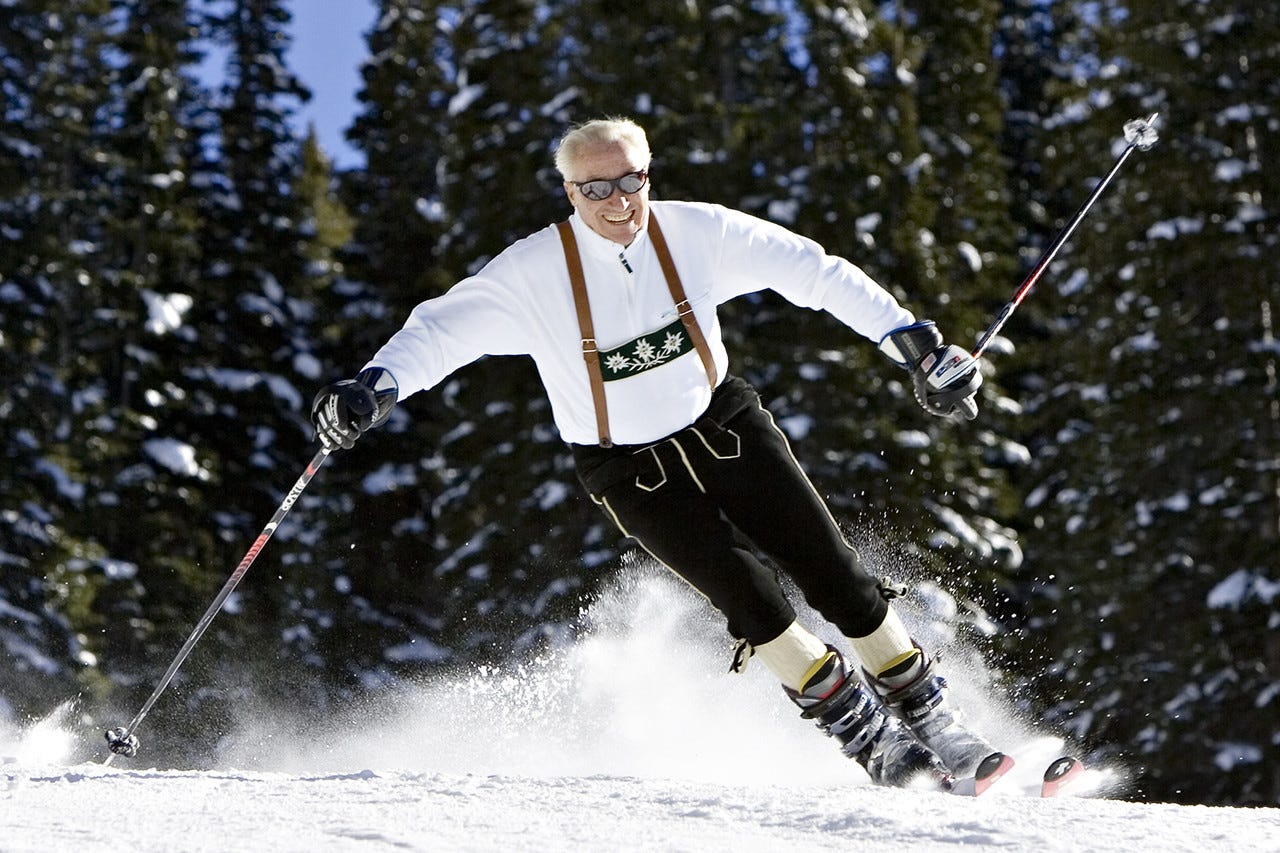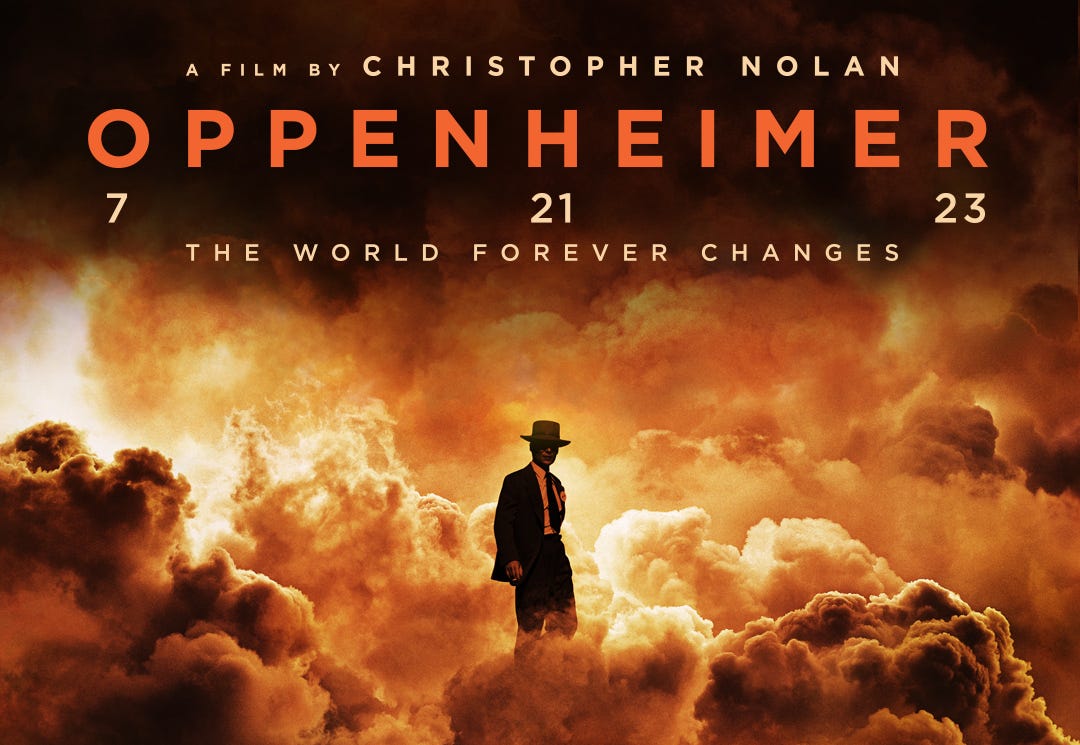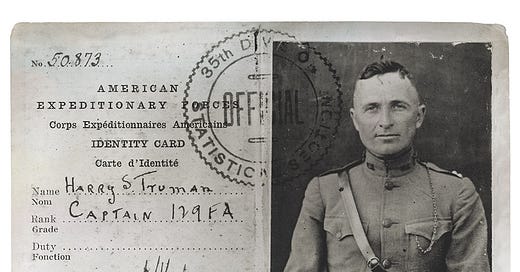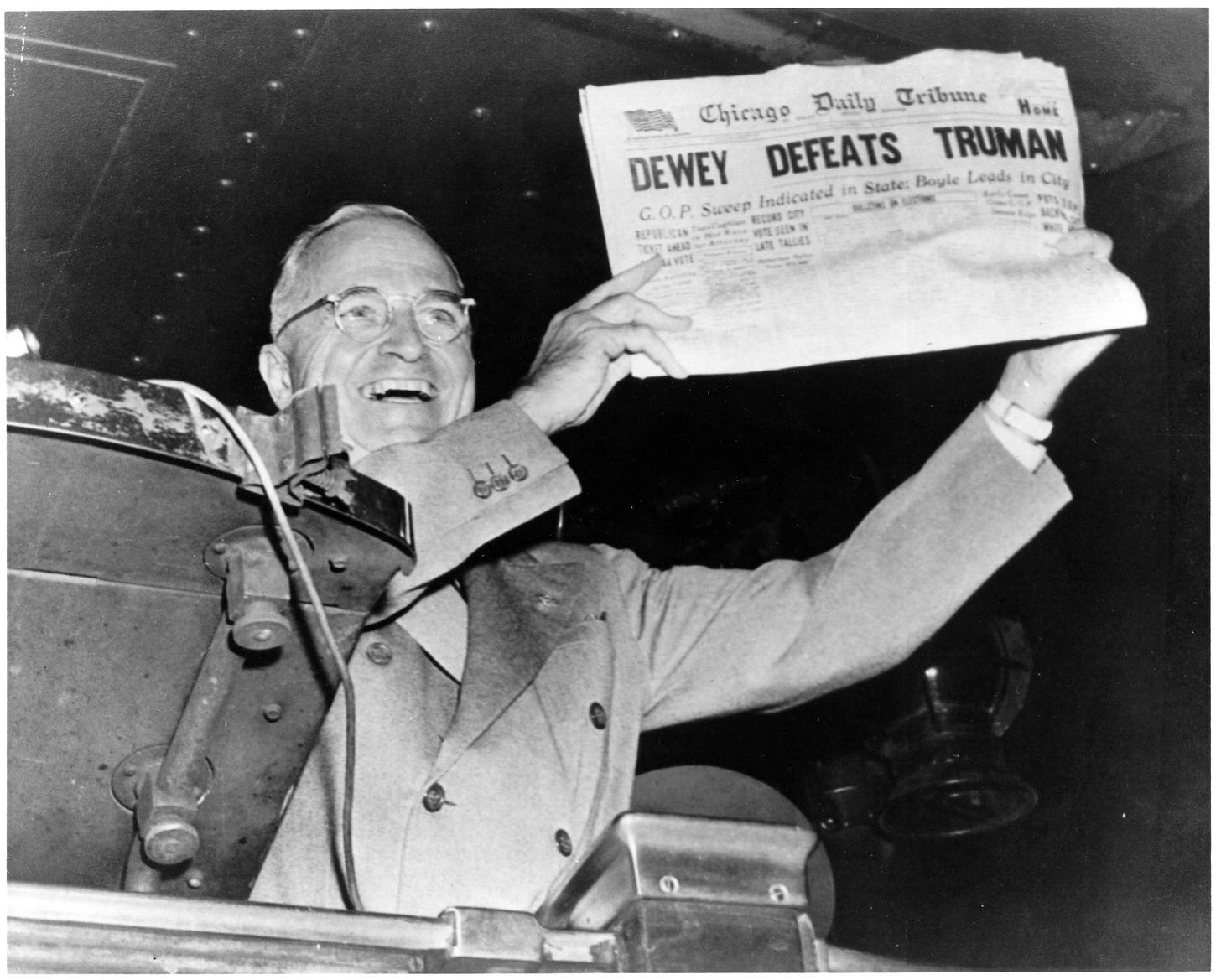The Sentinel #17: Lessons from Truman: Late Starts and Imperfect Information.
Truman, Oppenheimer and Obermeyer
Hello Readers,
After the last post on “Apple in India”, I got a note from a reader who reminisced that their dad had worked in one of the Bombay mills. The reader wrote that the mill caught fire and “[dad] had no job for 19 months and we went through some tough times as a family that made us stronger”. I was touched to receive the note. Thank you. I ❤️ these emails.
Sometimes, I feel that, as an academic, as a part of my job, I receive unexpected reports, and the last week has been an exercise in stoicism. In a contemplative mood, I went back to the notes I had made from my readings sometime back and it seemed like a good time to develop the essay.
-Senthil
—
I wanted to share 5 personal lessons that I took based on my notes from David McCullough’s excellent biography of President Harry S. Truman. Despite its voluminous size of 1100 pages (992 pages + notes), the book is exceedingly fast-paced (except perhaps for the first 30 pages tracing Truman’s ancestry).
President Truman was the only president in the 20th century who did not have a college degree, as he was unable to pay for college. He also couldn’t attend the US Military Academy at West Point, as he failed his eye test due to his poor eyesight. The legend is that he joined Missouri National Guard by memorizing the eye test. Later, he served in France during World War I.
Given how presidential qualifications and social preferences on elite institutions and college education have evolved, it is fair to say that he may probably be the last such president. Truman is also one of the presidents about whom my thoughts have altered significantly over the years.
Here we go..
1. It’s Never Too Late to Begin Your Project.
I love the idea of making late starts in life. Even this newsletter is a late start on the “other” side of the 40s. A striking example of a “late”-beginner is Klaus Obermeyer, the founder of Sport Obermeyer, who began his company in his late years, and is now 103 (in 2023). He attributes his good physical health to genes, skiing, swimming and Aikido which he started forty years back, when he was a young man of sixty!

President Truman is an excellent example of why nothing is too late to begin in life. He married at the late age of 36 to Bess Truman (after he returned from serving in WWI).
Truman’s life and business failures were many. He couldn’t get into college. The family farm was constantly under loans and barely made money to make ends meet. His first business venture as a retailer in his late 30s, after a flying start, shrunk and ultimately failed, leaving him in enormous debt, which he continued to pay back for several ensuing years. He did not enter politics until his 40s (perhaps handpicked by the Pendergast political machinery). He did not possess any of the oratory skills or the early promise that many other presidential candidates showed. He was in fact considered quite lackluster, but his sincere work ethic was his defining distinction.
His political roles — his selection as a senator, and his ascension to the vice-presidency, eventually the presidency — were at some level, late fortuitous accidents. He was also consistently underestimated when he assumed those roles. However, once in that position, he seized the chance. Truman was hard-working and tireless and he made a mark on every role he took, as evident in his quiet heroism in World War I, his charm and hard work in the Senate, and his indelible personal mark on the Presidency by taking the ultimate responsibility.
2. Don’t Let Your Roles Define You.
Being a professor, I always let myself see everything through that academic lens. I am sometimes scared to go back to basics. Truman was not afraid to be ordinary. He knew Presidency came to him as a gift, and he did not mind leaving the trappings of the Presidency, even as he loved being popular. McCullough writes about Truman,
He held to old guidelines: work hard, speak the truth, assume no airs, trust in God, have no fear.
Truman genuinely held on to his old friendships from years before. His political beginnings had came out of the Pendergast political machinery, (through a fellow soldier he met when he was shipped to Europe for the war). Truman was “loyal” in his friendships to a fault even after Pendergast was imprisoned.
After his presidency, he took the train back to Independence, MO, and settled down in the same modest house that he had lived in. (Before the JFK assassination, ex-presidents did not have secret service security detail). He declined speaking fees and all that post-presidency gravy train.
He would “do the right thing” for its own sake. Even though his relationship with the succeeding President Eisenhower was cold, Truman anonymously arranged for Eisenhower’s son (who was serving in Korea at that time) to come home to see his father’s inauguration as President.
We live in an era of wheeling and dealing political leaders and judiciary, bound neither by law nor constraints of impropriety. What an anomaly now, to learn that Truman lived more penuriously than all other former Presidents. Famously, Truman declined a Toyota car as a gift, because he would only buy American cars with his own money.
3. You Will Never Have All The Information You Need.
In an era where we have hassled un-stoic investors tweeting in all caps in total panic, it is a striking contrast to note how steadfast Truman was. Given that he had no inkling of momentous decisions that kept landing at his desk — no one really could have, given the extended length of Roosevelt's (FDR) years in the Presidency — his clarity of thinking and steadfastness in his decisions were impressive.
Truman presided over the country through some extraordinary times: the fall of the Third Reich, the dropping of the Atomic Bombs, the founding of the UN, the growth of the Iron Curtain, the founding of Israel, the birth of modern China, the Korean War, and virulent McCarthyism.
The atomic bombing of Hiroshima and Nagasaki is an indelible tragedy and a terrible event in the evolution of human history. The decisions leading to it seem to have been stockpiling at a dramatic and gathering pace even before Truman arrived at the White House. Tokyo was already carpet-bombed at a staggering scale exceeding the Allied bombings at Dresden — 80,000 deaths by some accounts. However, “S1” — the code for the atomic bomb — was an entirely different monstrous beast in its appetite for death and destruction. But, Truman was the one who had to make the final decision.
Perhaps anyone without the humble background and decisiveness of Truman would have borne the humongous weight of the decision miserably, as it eventually destroyed Oppenheimer. In his meeting with Oppenheimer, who was quite distraught, Truman was clear in apportioning any blame on himself, as he Truman, not Oppenheimer, had made the final decision.
Oppenheimer was also an interesting figure — a polyglot, and a distraught genius. It is said he once tried to poison his colleague. Oppenheimer taught himself Sanskrit. Of the atomic explosion, “Now I am become Death, the destroyer of worlds” — he quoted Bhagavad Gita, not in Krishna’s omniscience, but, sinking in the self-dread of death and mayhem from the knowledge, like Arjuna. On Oppenheimer, I recommend the excellent American Prometheus: The Triumph and Tragedy of J. Robert Oppenheimer, by Kai Bird and Martin Sherwin.

David McCullough does not record any anguish or self-punishing introspection from Truman of the decision, which is honestly troubling. He made a terrible decision and he was going to live through it — he gets to live after all, unlike the thousands that didn’t — because Truman felt that one couldn’t go back and change the past.
Perhaps such gumption has its negatives. This unfortunate level of introspection has continued as the US military policy with successive governments displaying distress about the prospect of future deaths while being defiantly dismissive of past deaths as an ugly necessity of wars.
4. Never Give Up Without Trying.
The “Dewey Defeats Truman” picture (above) is probably the most well-known picture of Truman. I came across the picture as a 17-year-old in India not knowing much of Truman.1
Now, we know from Operations, that forecasts improve as we get closer to the event that is being forecast. Truman had imbibed this concept in spirit. It is unsurprising perhaps, as he was known to be a solid poker player, and knew when to fold, and when to bet against the odds. Even though it was years before the emergence of NYTimes Upshot and 538 (which is now being disbanded by ABC?), the Dewey-Truman surprise can be understood by the noisiness of long-term forecasts. The last real poll of the 1948 election was at least a month ahead of the November elections. (Dewey led by nine points in the polls).
In fact, in its October 11, 1948 issue, three weeks before the election, Newsweek had polled 50 writers for their forecasts of who will win the Presidency. The result: 50 for Dewey, 0 for Truman. If one went by the polls, the election was as good as over. Truman looked at the article and said (according to McCullough), saltily exclaimed:
“I know every one of these 50 fellows. There isn’t one of them has enough sense to pound sand in a rat hole.”
We all know how that history panned out. Through his intuition, and relentless hard work on his Whistle Stop tour, Truman changed the odds of winning.
5. No One Is Perfect.
Truman had his controversies and blind spots. i think his personal foibles pale in comparison to the presidents that followed him, but nevertheless, they were remarkable.
Truman came from a family that held a deep distrust for Lincoln from the civil war. His mother, ‘Mama’ Truman was appalled when it was suggested to her that she could sleep in the Lincoln Bedroom when she visited the White House. She would have chosen to sleep on the floor instead!
Truman was also skeptical of the civil rights struggle, definitely of its modus operandi, and perhaps even of its ultimate goal. He also held a personal distaste for JFK, partly because of JFK’s Catholicism and partly because of his purported inexperience. Despite trusted advice to the contrary, Truman chose to air his grievances at the nomination convention. Another lens to view this dislike is economic status. Truman always believed that he was a friend of the “common man”, which he felt JFK was not.
Once, overcome with emotions after reading a deeply critical review of his daughter Margaret’s theatrical performance, he wrote an ill-advised invective to the Washington Post critic Hume (here is the letter link from Truman Library) threatening to assault him. Truman’s spokesperson Charlie Ross, who would have prevented this mishap, had unexpectedly and suddenly died of coronary occlusion just a few days back.
Mr. Hume:
I’ve just read your lousy review of Margaret’s concert. I’ve come to the conclusion that you are an “eight ulcer man on four ulcer pay.”
It seems to me that you are a frustrated old man who wishes he could have been successful. When you write such poppy-cock as was in the back section of the paper you work for it shows conclusively that you’re off the beam and at least four of your ulcers are at work.
Some day I hope to meet you. When that happens you’ll need a new nose, a lot of beefsteak for black eyes, and perhaps a supporter below!
Pegler, a gutter snipe, is a gentleman alongside you. I hope you’ll accept that statement as a worse insult than a reflection on your ancestry.
H.S.T.
Perhaps as a reminder of the costs of his mishaps, Truman also kept, in the Oval Office drawer, an astringent letter written by the parents of a Purple Star veteran who lost his life in the Korean War. They, in returning their son’s medal, had admonished Truman over his poor behavior.
In his interview with the writer John Hersey,2 Truman mentioned “The President of the U. S. is two people, he's President & a human being. He has to spend about half the time keeping the human being in line, and, at that, he doesn't do a very good job.”
—
That’s a great observation. We aren’t always good at keeping ourselves at safe from our own actions. There is mote in our eye and many role-playing monkeys in our brains — uncontrolled and relentless. We make mistakes. Hopefully, we make amends as well.
See you all next week!
If you like reading this post, please subscribe and support this free newsletter.
It was astonishing to me then that a newspaper would print such a headline declaring results ahead of the results. Indian election results are never announced until all the votes were counted, tabulated, and certified (which causes a significant delay, of course, even with electronic voting). Unaware of the nature of statistical “calls” of results, I had assumed the half-truth that the newspaper brazenly printed the results before they were announced.
John Hersey, the author of Hiroshima was provided with extraordinary inside access to the workings of the Truman White House and wrote an excellent profile for the New Yorker magazine. Mr. President: A Weighing of Words by John Hersey. New Yorker. May 5, 1951 Issue.






